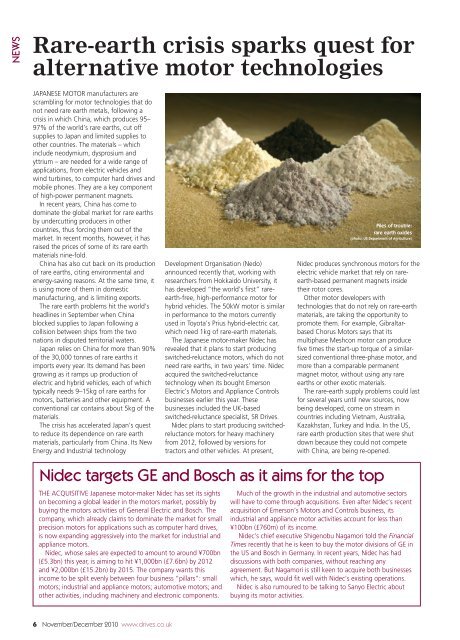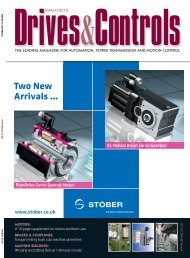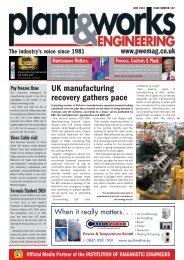New Danfoss VLT® Decentral Drive E cient, reliable and powerful
New Danfoss VLT® Decentral Drive E cient, reliable and powerful
New Danfoss VLT® Decentral Drive E cient, reliable and powerful
You also want an ePaper? Increase the reach of your titles
YUMPU automatically turns print PDFs into web optimized ePapers that Google loves.
NEWS<br />
Rare-earth crisis sparks quest for<br />
alternative motor technologies<br />
JAPANESE MOTOR manufacturers are<br />
scrambling for motor technologies that do<br />
not need rare earth metals, following a<br />
crisis in which China, which produces 95–<br />
97% of the world’s rare earths, cut off<br />
supplies to Japan <strong>and</strong> limited supplies to<br />
other countries. The materials – which<br />
include neodymium, dysprosium <strong>and</strong><br />
yttrium – are needed for a wide range of<br />
applications, from electric vehicles <strong>and</strong><br />
wind turbines, to computer hard drives <strong>and</strong><br />
mobile phones. They are a key component<br />
of high-power permanent magnets.<br />
In recent years, China has come to<br />
dominate the global market for rare earths<br />
by undercutting producers in other<br />
countries, thus forcing them out of the<br />
market. In recent months, however, it has<br />
raised the prices of some of its rare earth<br />
materials nine-fold.<br />
China has also cut back on its production<br />
of rare earths, citing environmental <strong>and</strong><br />
energy-saving reasons. At the same time, it<br />
is using more of them in domestic<br />
manufacturing, <strong>and</strong> is limiting exports.<br />
The rare earth problems hit the world’s<br />
headlines in September when China<br />
blocked supplies to Japan following a<br />
collision between ships from the two<br />
nations in disputed territorial waters.<br />
Japan relies on China for more than 90%<br />
of the 30,000 tonnes of rare earths it<br />
imports every year. Its dem<strong>and</strong> has been<br />
growing as it ramps up production of<br />
electric <strong>and</strong> hybrid vehicles, each of which<br />
typically needs 9–15kg of rare earths for<br />
motors, batteries <strong>and</strong> other equipment. A<br />
conventional car contains about 5kg of the<br />
materials.<br />
The crisis has accelerated Japan’s quest<br />
to reduce its dependence on rare earth<br />
materials, particularly from China. Its <strong>New</strong><br />
Energy <strong>and</strong> Industrial technology<br />
Development Organisation (Nedo)<br />
announced recently that, working with<br />
researchers from Hokkaido University, it<br />
has developed “the world’s first” rareearth-free,<br />
high-performance motor for<br />
hybrid vehicles. The 50kW motor is similar<br />
in performance to the motors currently<br />
used in Toyota’s Prius hybrid-electric car,<br />
which need 1kg of rare-earth materials.<br />
The Japanese motor-maker Nidec has<br />
revealed that it plans to start producing<br />
switched-reluctance motors, which do not<br />
need rare earths, in two years’ time. Nidec<br />
acquired the switched-reluctance<br />
technology when its bought Emerson<br />
Electric’s Motors <strong>and</strong> Appliance Controls<br />
businesses earlier this year. These<br />
businesses included the UK-based<br />
switched-reluctance specialist, SR <strong>Drive</strong>s.<br />
Nidec plans to start producing switchedreluctance<br />
motors for heavy machinery<br />
from 2012, followed by versions for<br />
tractors <strong>and</strong> other vehicles. At present,<br />
Piles of trouble:<br />
rare earth oxides<br />
(photo: US Department of Agriculture)<br />
Nidec produces synchronous motors for the<br />
electric vehicle market that rely on rareearth-based<br />
permanent magnets inside<br />
their rotor cores.<br />
Other motor developers with<br />
technologies that do not rely on rare-earth<br />
materials, are taking the opportunity to<br />
promote them. For example, Gibraltarbased<br />
Chorus Motors says that its<br />
multiphase Meshcon motor can produce<br />
five times the start-up torque of a similarsized<br />
conventional three-phase motor, <strong>and</strong><br />
more than a comparable permanent<br />
magnet motor, without using any rare<br />
earths or other exotic materials.<br />
The rare-earth supply problems could last<br />
for several years until new sources, now<br />
being developed, come on stream in<br />
countries including Vietnam, Australia,<br />
Kazakhstan, Turkey <strong>and</strong> India. In the US,<br />
rare earth production sites that were shut<br />
down because they could not compete<br />
with China, are being re-opened.<br />
Nidec targets GE <strong>and</strong> Bosch as it aims for the top<br />
THE ACQUISITIVE Japanese motor-maker Nidec has set its sights<br />
on becoming a global leader in the motors market, possibly by<br />
buying the motors activities of General Electric <strong>and</strong> Bosch. The<br />
company, which already claims to dominate the market for small<br />
precision motors for applications such as computer hard drives,<br />
is now exp<strong>and</strong>ing aggressively into the market for industrial <strong>and</strong><br />
appliance motors.<br />
Nidec, whose sales are expected to amount to around ¥700bn<br />
(£5.3bn) this year, is aiming to hit ¥1,000bn (£7.6bn) by 2012<br />
<strong>and</strong> ¥2,000bn (£15.2bn) by 2015. The company wants this<br />
income to be split evenly between four business “pillars”: small<br />
motors; industrial <strong>and</strong> appliance motors; automotive motors; <strong>and</strong><br />
other activities, including machinery <strong>and</strong> electronic components.<br />
Much of the growth in the industrial <strong>and</strong> automotive sectors<br />
will have to come through acquisitions. Even after Nidec’s recent<br />
acquisition of Emerson’s Motors <strong>and</strong> Controls business, its<br />
industrial <strong>and</strong> appliance motor activities account for less than<br />
¥100bn (£760m) of its income.<br />
Nidec’s chief executive Shigenobu Nagamori told the Financial<br />
Times recently that he is keen to buy the motor divisions of GE in<br />
the US <strong>and</strong> Bosch in Germany. In recent years, Nidec has had<br />
discussions with both companies, without reaching any<br />
agreement. But Nagamori is still keen to acquire both businesses<br />
which, he says, would fit well with Nidec’s existing operations.<br />
Nidec is also rumoured to be talking to Sanyo Electric about<br />
buying its motor activities.<br />
6 November/December 2010 www.drives.co.uk




